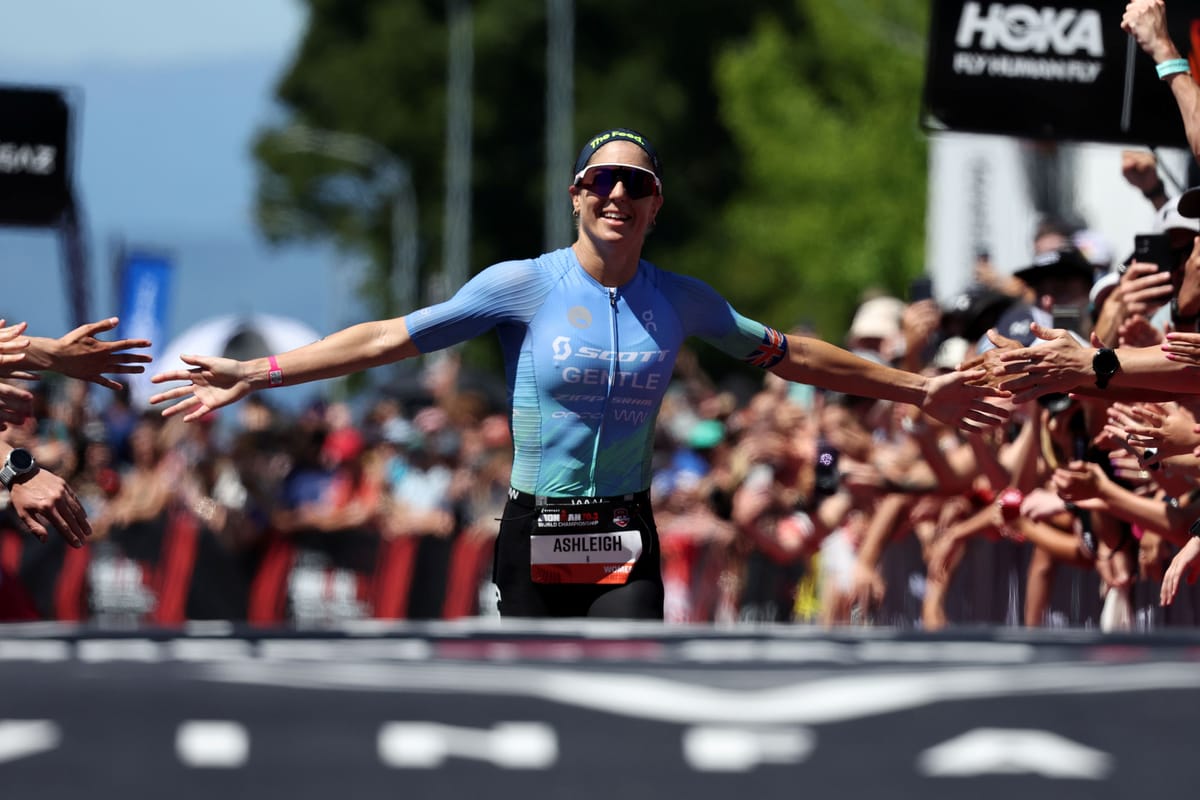If you'd grabbed a flat white in Taupo at 5am Saturday morning, you might've thought the entire triathlon world had descended on this lakeside town. You wouldn't have been wrong. After a four-year wait (cheers, COVID), the 70.3 World Championship finally landed in New Zealand, bringing with it enough Olympic hardware to set off airport security.
The pre-race chatter centred on two narratives: Taylor Nib's shot at a historic three-peat and Kat Matthews' chance to cement her dominance in the inaugural Pro Series. Chuck in Olympic silver medalist Julie Derron and our own Ash Gentle making her 70.3 worlds debut (wrap your head around that one).
The morning brought that classic Kiwi mix of crisp air and anticipation, with Lake Taupo sitting at a refreshing 18.8°C. Perfect wetsuit temperature, if you're asking. But it wasn't just the water that had everyone's attention - the sacred significance of these waters had been a constant theme throughout race week. As local favorite Kyle Smith reminded everyone at the press conference, "These lands are sacred... we get to share the water and share the lands and share blood, sweat, and tears that those warriors did hundreds of years ago."
Pre-race favorite Nib was doing her usual thing - looking simultaneously relaxed and laser-focused, if that's even possible. She'd admitted her coach wasn't keen on her racing this late in the season but sometimes you've just got to follow your gut. Speaking of guts, Matthews was carrying the weight of potentially $200K in Pro Series money on her shoulders, yet looked about as stressed as someone picking a brunch spot.
The transition area buzzed with that unique world championship energy - you know the kind where even the pros look like they're trying not to look nervous?
The scene was set for what promised to be one of the most competitive women's races in recent memory. Little did we know just how right that prediction would be.
Shame about that 5am alarm though. Some things in triathlon never change, even at world champs.
First Cab Off the Rank: Nib Shows Her Cards Early
Remember when we used to think Taylor Nib was "just okay" in the swim? Yeah, those days are long gone. The American led the charge into Lake Taupo's sacred waters with a swim split that had everyone checking their splits twice - 24:20 for the 1.9km course. Not bad for someone who "accidentally" led the entire field off course in the first 300m (her words, not ours).
The real drama kicked off at that first turn buoy, where what looked like a well-organised line quickly turned into absolute carnage. Sarah Perez Sala, proving swimming fast is still very much her thing, emerged as the first athlete to hit terra firma, with Nib and local hope Bec Clark forming a formidable front quartet.
The chase pack? More like a small army. Kat Matthews (showing that swim improvement isn't just talk), Julie Derron (because Olympic silver medalists tend to swim well), and Ash Gentle all exited within 30 seconds of each other. The gap to the leaders? A manageable 1:45 - the kind of deficit that makes things interesting but doesn't end anyone's day before breakfast.

Swim
First out: Sarah Perez Sala - 24:20. Front pack gap to first chase: 1:45. Temperature: 18.8°C (wetsuit legal, but only just). Number of athletes within 2 minutes of the lead: 12
If you're wondering about pre-race favourite Imogen Simmonds, she had what we'll politely call an "adventurous" swim, including what looked like a brief moment of panic that required some backstroke intervention. But like any proper pro, she sorted herself out and got back in the mix.
The real story? That 400m run into T1. When you're charging uphill post-swim at world champs, suddenly those pool sets you skipped start sending their regards. Just ask Ellie Salthouse, who later admitted the climb felt more like Heartbreak Hill than a transition run.
By the time the last pro cleared the water, one thing was crystal clear - this wasn't going to be the usual "Taylor takes off, everyone else races for second" kind of day. At least, that's what we thought heading into the bike leg.
The Taylor Nib Masterclass: How to Break a World-Class Field on Two Wheels
The American superhero (sorry, professional triathlete - though at this point, what's the difference?) turned the 90km Taupo bike course into her personal time trial playground, delivering what might go down as the most impressive 70.3 worlds bike split we've seen. Her 2:10:00 wasn't just fast - it was "make everyone else question their life choices" fast.
But here's where it gets proper interesting. While Nib was off playing solo artist up front, the chase group dynamics unfolded. Kat Matthews and Imogen Simmonds formed the first meaningful chase, working together like they'd been practicing it all season. Behind them? A group big formed including Julie Derron and Ash Gentle, who were probably wondering if someone had accidentally signed them up for a group ride instead of a world championship.
The Course Factor
Let's talk about that bike course for a second. The new layout (because apparently the old one wasn't hard enough) took the athletes past the Wairakei geothermal area, where the steam vents provided a dramatic backdrop - and a helpful wind direction indicator. The infamous New Zealand chip-seal roads? They turned what should have been a smooth time trial into something more akin to riding over cobblestones while trying to solve a Rubik's cube.
The Tactical Game
While Nib was doing Nib things (read: disappearing into the distance), the real tactical battle was playing out behind. Matthews and Simmonds worked the legal draft zone like it was an art form, taking turns at the front while trying to minimise the damage. Their reward? Only losing two minutes to Nib instead of four. In the world of long-course triathlon, we call that a win.
The Drama
- Marta Sanchez and Sarah Perez Sala both copped blue cards for drafting (timing is everything, folks)
- The chase group of 12 eventually splintered into smaller, more manageable packs
- Ellie Salthouse made a heroic bridge attempt that probably deserved its own documentary
The Turning Point
If you're looking for the moment the race was won (spoiler alert), it came around the 70km mark. Nib, apparently decided that a three-minute lead wasn't quite comfortable enough, put down a surge that had the timing officials double-checking their watches. The gap went from "maybe catchable" to "well, there's always next year" in the space of about 10km.
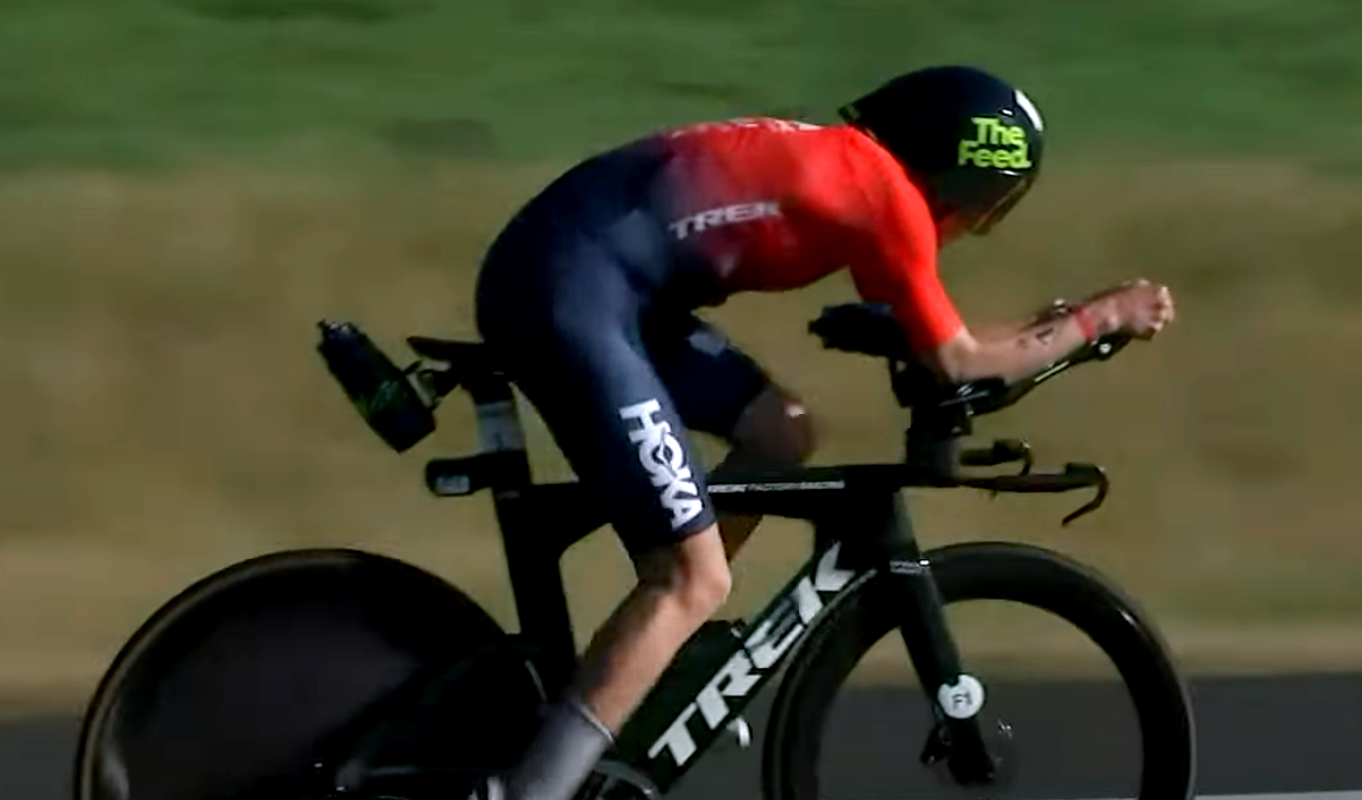
Taylor's Bike
First 20km: Built a 90-second lead. Middle section: Extended to 2:30. Final 20km: Unleashed hell with another 2-minute gain. Total damage: 4:26 by T2. Average speed: 41.5km/h
By the time Nib rolled into T2 looking fresher than most of us do after a coffee ride, the question wasn't whether she'd win - it was whether anyone would get within shouting distance by the finish. Matthews and Simmonds hit T2 at 4:26 back, with the main chase pack (including our pre-race podium picks Gentle and Derron) rolling in at a sobering 7:30 behind.
The Real Talk
Want to know how dominant Nib's bike leg was? Consider this: she put more time into a world-class field on the bike than most people take for a coffee stop. The scariest part? In her post-race interview, she casually mentioned she "probably overrode it a bit." If that's overriding it, the rest of the field might want to avoid checking Strava when she's actually trying.
As the athletes racked their bikes and headed out onto the run course, one thing was crystal clear: while the race for first might have been all but decided, the battle for the remaining podium spots was about to get properly spicy.
Tale of Two Chases: When Second Place Feels Like a Victory
If you'd offered Kat Matthews a minute-fifteen deficit to Taylor Nib at the finish line while she was racking her bike in T2, she might've bitten your hand off. But that's exactly what the British powerhouse managed to produce, thanks to what might be the run of her career.
We've seen some proper running at world champs before, but what Matthews pulled off deserves its own section in the "How to Chase Like You Mean It" handbook. Starting 4:26 down, she immediately went to work, clicking off the kilometres.
Meanwhile, behind this front-end drama, the battle for bronze was turning into the kind of tactical chess match that makes commentators earn their money. Ashley Gentle, found her rhythm around the 5km mark. Julie Derron, fresh off Olympic silver in Paris, was doing her best to channel that short-course speed.
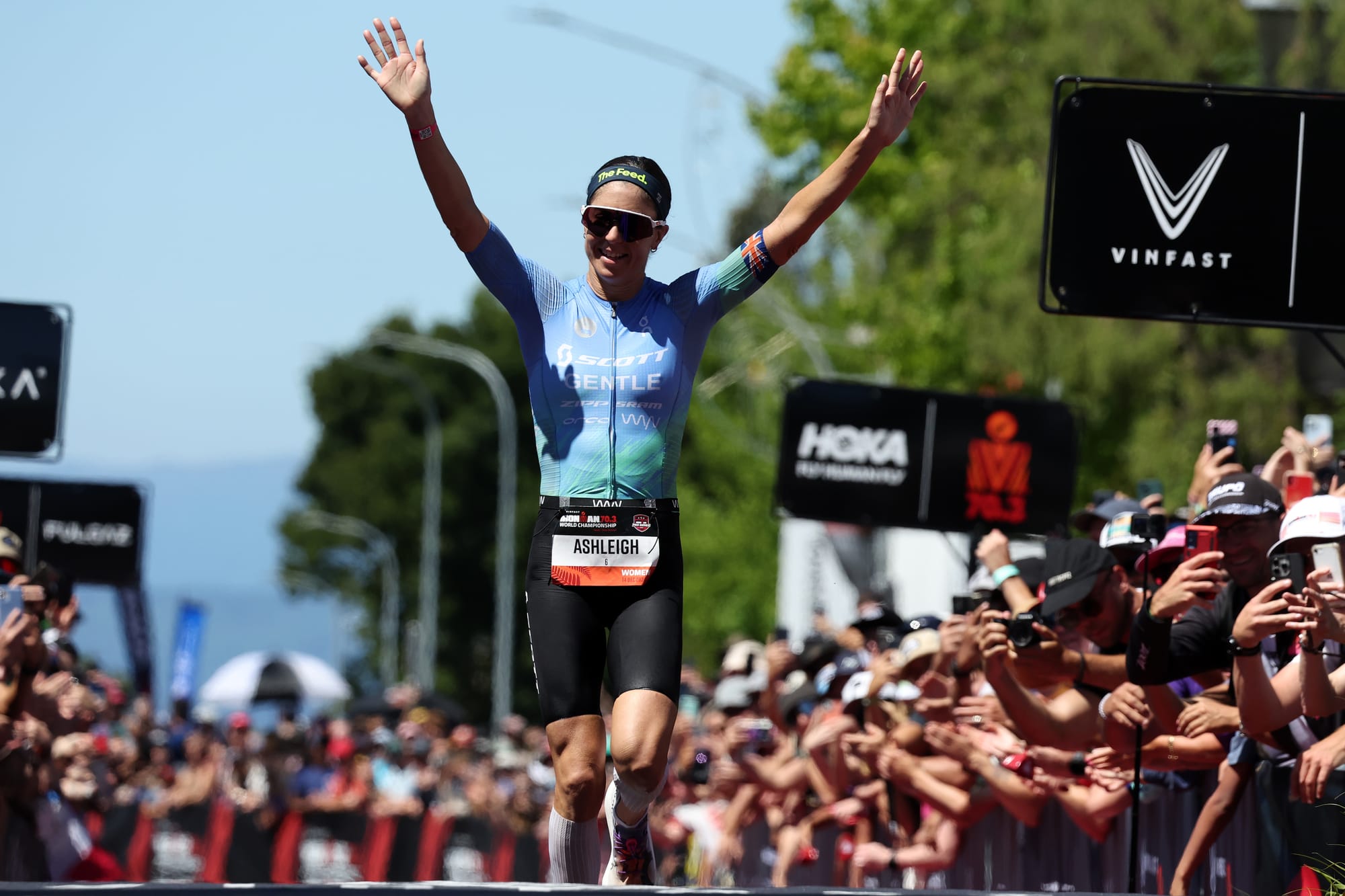
The Gentle Approach
Here's where it gets interesting. Gentle played it smart - textbook "how to run yourself onto a world championship podium" stuff. Instead of trying to bridge the gap to Derron in one hit, she slowly reeled her in, made the pass stick, then set her sights on Imogen Simmonds. The result? A 1:16 run split that looked easier than it had any right to.
The Drama Up Front
Back to our leader, though. Remember when we all thought Nib had this wrapped up? Someone forgot to tell Matthews. By the 15km mark, she'd carved the lead down to 2:35. Nib, meanwhile, was doing that thing where you try not to look behind you while absolutely looking behind you.
The Critical Moments
- 5km: Matthews already 30 seconds faster than anyone else
- 10km: Gentle makes her move on Derron
- 15km: Nib's "quick" portaloo stop (because even champions are human)
- 18km: Matthews gets visual contact with Nib
- 19km: Gentle secures bronze with authority
Let's talk about that portaloo stop for a second. When you're leading a world championship by four minutes and still have to make a pit stop? That's the kind of confidence that comes with three straight world titles. Though we reckon Nib might've picked up the pace a bit after seeing Matthews' splits.
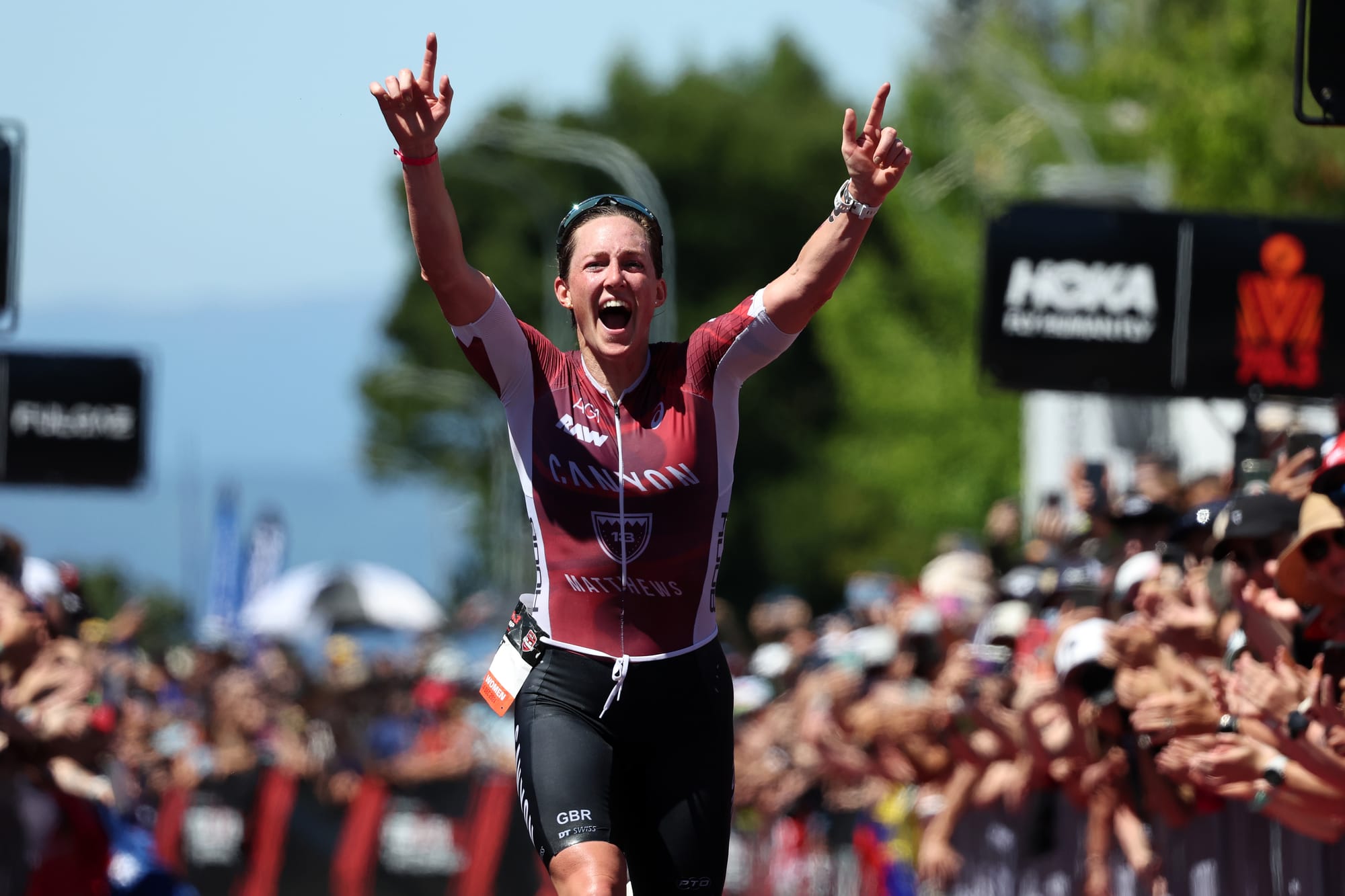
The Real MVPs
- Kat Matthews' run form (getting better with age, like a fine wine)
- Gentle's patience (good things come to those who wait... and then sprint)
By the time Nib hit the finish chute in 3:57:34, she'd done enough to claim that historic three-peat. But the story of the day might just be Matthews, whose 1:15:20 run split not only secured second place but sent a clear message: 2025 might be a very different story.
The Podium Math
- Taylor Nib: 3:57:34 (Three-peat complete, still looking fresh enough for another lap)
- Kat Matthews: 3:58:49 (Pro Series champion and owner of probably the most impressive run split we'll see this year)
- Ashley Gentle: 4:03:01 (Proof that playing the long game sometimes pays off)
As the dust settled on what might go down as one of the most tactically interesting runs in 70.3 world championship history, one thing became clear: the gap between Nib and the rest of the world is closing. Whether it's closed enough is a question we'll have to wait until next year to answer.
Meanwhile, Matthews was probably already calculating how many seconds per kilometer she needs to find in the off-season. Our advice? Maybe check those numbers after a good night's sleep and a proper coffee.
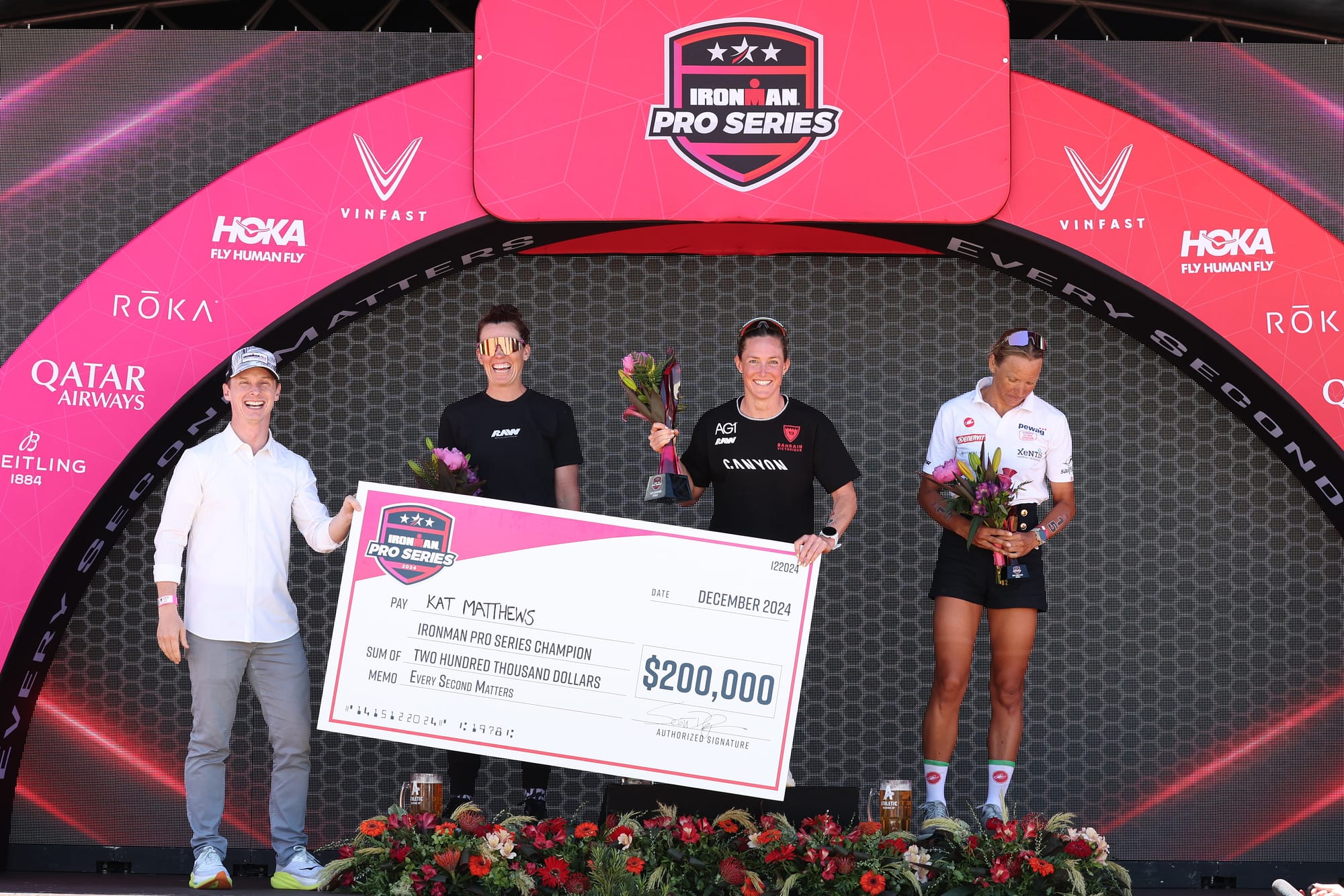
Show Me The Money: Matthews Banks Historic First Pro Series Title
While Taylor Nib was busy making history with her three-peat, Kat Matthews was quietly (okay, not so quietly) writing her own chapter in the history books. Let's talk about what just went down in the inaugural Pro Series standings, because these numbers are proper tasty.
The Final Tally
- Kat Matthews: 20,761 points (and a cool $200K richer)
- Jackie Hering: 18,093 points (solid banking despite a rough day at the office)
- Lotte Wilms: 17,678 points (late season surge pays off)
- Hannah Berry: 17,124 points (local hero moves up three spots)
- Maja Stage Nielsen: 16,890 points
The Real Talk
Remember when we all thought racing every weekend might hurt Matthews' chances? Yeah, about that... Turns out racing yourself fit is still a thing, because our girl just dropped the most consistent season we've seen since Daniela Ryf was making everyone question their life choices.
The Money Trail
- Winner's check: $200,000 (not bad for a year's work)
- Total series purse: $1.7 million
- Points for a world champs win: 3,000
- Value of showing up: Top 50 all get paid (hello, end-of-season motivation)
The Moves That Mattered
- Hannah Berry's late-season charge (up three spots in the rankings)
- Lot of Wilms' steady climb (death by consistency)
- Els Visser sneaking into seventh (because racing every weekend sometimes pays off)
Here's the kicker - Matthews didn't just win this thing, she basically wrote the blueprint for how to tackle a season-long series. Race often? Check. Show up at the big ones? Check. Turn up at world champs and run a 1:15 half marathon just to flex? Massive check.
The Bigger Picture
For all the talk about whether pros would embrace the series format, the final standings tell a pretty clear story: give triathletes a reason to race (and a proper payday), and they'll put on one hell of a show. The real question now is whether anyone can match Matthews' near-perfect scoring next year.
Looking at these numbers, two things become crystal clear: the Pro Series is here to stay, and Kat Matthews just set the bar higher than a Kona qualification cutoff. Good luck to anyone trying to match this performance in 2025 - you might need it.



